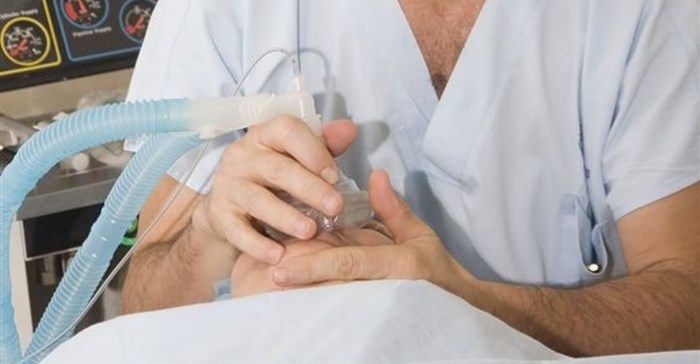What are the real costs of safe surgery in South Africa? That is the question members of the South African Society of Anaesthesiologists (SASA) attempted to answer recently.
The discussions focused on ensuring patient safety during surgery as well as other issues faced by the anaesthesiology field and solutions for the future.
SASA members included Natalie Zimmelman, SASA CEO; Dr Dirk van Zijl, SASA president; Dr Sean Chetty, SASA national treasurer; and council member. Dr Rudolf Mononyane. They were joined by Professor Chris Lundgren, head of the department of anaesthesiology at the University of the Witwatersrand and the official SASA representative to the National Committee for the Confidential Enquiry into Maternal Death (NCCEMD), a government-owned project.
Topics covered included:
- how greater access to safe surgery is a necessity for South Africa;
- the financial and health costs of the anaesthesia skills shortage in our country; and
- why people pay for specialists and how this adds value to the country.
Shortage of specialists
Zimmelman said that healthcare is a complex environment and SASA wants to draw attention to the critical role a skilled anaesthetist plays in ensuring patient safety during surgery, as well as concerns about the sustainability of the profession. There is a shortage of properly trained and qualified anaesthesiology specialists in South Africa, resulting in a drain on manpower, resources and finances, which directly affects patients’ health, safety and costs.
The Human Resources for Health strategy document published by the government in January 2012 recorded an estimated shortage of 1,300 anaesthesiologists in the country.
“We knew back then that there was a shortage, and yet no proactive plan has been devised or implemented to address this,” said Zimmelman.
“We have too few specialists, which means everyone is working extraordinary hours, and we don’t have enough people to safely cover all the procedures to ensure patient safety.”
The SASA private practice business unit (PPBU) surveyed 318 anaesthetic specialists who are registered with the Health Professions Council of South Africa (HPCSA). It found that 192 (60,4%) in private practice worked more than 37 hours per week. That accounted for just 70% of their total hours worked in a week as the other 30% of their time was spent on admin.
This is contributing hugely to the stress of the profession. Most members indicated that they would prefer to work less hours and less than 5% indicated that they had the capacity and willingness to work more hours. This indicates that the existing number of specialists is already beyond capacity.
Economics of safe surgery
A major issue is the escalating cost of patient safety in surgery and how this affects patients who cannot afford it. The economics of patient safety in surgery is a multifaceted topic. On the face of it, keeping patients safe during surgery is an expensive exercise, but the cost of trying to make it cheaper in the short run can have extensive and devastating costs in the long-term.
The Saving Mothers 2011-2013: Sixth report on confidential enquiries into maternal deaths in South Africa by the National Committee for the Confidential Enquiries into Maternal Deaths states that of all maternal deaths recorded, the skills and training shortage directly influenced these deaths: “Lack of appropriately trained doctors was recorded as a significant factor in 47%, 27%, 24% and 19% of maternal deaths due to anaesthesia, obstetric haemorrhage, pregnancy-related sepsis and complications of hypertension, respectively.”
SASA reiterated that having a skilled person performing anaesthesia is critical for the prevention of complications and not just deaths.
Van Zijl said, “Patients only remember the incidents. In anaesthesia, if you do your job well then no one is going to remember and value you. Patients have come to expect that but fail to realise that we’re doing so well because we have highly skilled specialists doing the anaesthesia.”
Lundgren stressed that people need to be educated about anaesthesiology in order to make informed and better medical decisions. She also believes this will go a long way to establishing the value of anaesthesiology among the public.
Van Zijl put it into perspective. “Anybody can put you to sleep but it takes a skilled person, usually an anaesthesiologist to wake you up,” he said.
Lack of skills
Chetty focused on the lack of skills in the public sector and the fact that anaesthesia is being provided by doctors not trained in the discipline, especially in rural communities. He added that there needed to be more training and that if more registrar posts are made available, South Africa could increase training with the current capacity at the country’s teaching hospitals. However, these would still be relatively small numbers.
“The decentralised healthcare education model is probably the only viable model for us to increase the number of properly trained healthcare professionals in the country,” he said.
He explained that constraints are frustrating, as decreased budgets mean decreased resources; fewer drugs, equipment and time available; and fewer skilled personnel.
“I am only as good as the team that I work with,” said Chetty. He further explained that the lack of skills didn’t just pertain to trained doctors but extended to nurses and support staff that are also needed.
Rising costs
Zimmelman stressed that SASA does recognise affordability as an important matter, together with patient safety. “We do recognise that healthcare costs are rising and that it is becoming more and more difficult for the country and the patient to afford this. We must all take responsibility for finding ways to contain these costs. However, we’ve got to save money in the right places, and training or using lower skills are not those places,” she said.
To reduce the risk patients’ face and the extensive cost of complications, SASA maintains that what’s fundamentally required are the right skills and the right support, with the right understanding of the role of anaesthesia.



















































